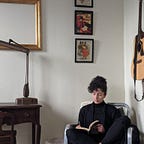Part 5: El Ingeniero con Alma de Poeta
Caracas
Each evening before bed, my father rotated between reading a book and watching Who Wants to Be a Millionaire. I climbed into his bed regardless of the selection and spent my evenings hearing him think out loud.
Every so often, when I guessed the correct answer on the television, his face beamed with pride as he raised a glass of Venezuelan rum and cheered the thought of his daughter inheriting his intelligence.
We played a game during commercial breaks meant to test my balance. He laid flat on his back and slid his heels towards his bum so that his knees jutted upwards into the air. I would stand on each knee and hold on to his hands as he slowly released each of my fingers, progressing until I stood above him with arms outstretched. Beyond the practical applications of good balance for walking in heels and shedding any fear of heights, he emphasized the importance of seeking balance in a theoretical sense.
The steadiness my mother found in him was rooted in his capacity to stabilize chaos by avoiding extremities in attitudes and behaviors, grounding himself by steering along his center of balance rather than by popular belief.
He ridiculed obsession and prized a measured temperament, especially with heated topics such as politics and religion. His levelheaded intuition guided him until Venezuela’s decline, when his love for our home blinded him from the realities surrounding us. Once things fell apart faster than they were built, he lost the sense of control necessary for maintaining balance.
While still living in Caracas, our family woke each morning to the sound of parrots flying from one end of the mountain to the other. The windows in our Caracas apartment looked onto el Cerro del Avila, the mountain after which we named our dog in the United States.
The furthest edge of our living room was lined with bay windows from which my father sat after a day’s work and looked onto a metropolis in the lush valley we called home.
From the moment my father made a comfortable salary, he befriended a tailor and shoemaker in Caracas to fill his wardrobe. The tailor, a son of Italian immigrants, imported the finest fabrics from his native land before constructing my father a suit completed by ornate suspenders.
The shoemaker pounded and stretched brown leather the color of cinnamon to follow the exact shape of my father’s feet, enclosing his steps in beautiful artisanship unlike any other in the streets of Caracas.
Every so often, I sneaked into my father’s closet and ran my fingers along the sleeves of each blazer, trying them on and strutting around the apartment as the carefully pleated hems grazed our wooden floor.
Although our arrival to America gradually undermined my father’s expensive habits, he maintained a preference for spending good money on one good item rather than scouring for discounted prices among poorly made counterparts.
The day after his passing, each of his children inherited a Mont Blanc pen, eliciting memories of his elaborate storytelling accompanied by drawings of tall buildings on a napkin as ink dripped freely onto the table.
Five years after our move to Caracas, my father retired and dedicated himself to dairy production at the family farm.
We left behind the winding roads immersed in flora, the sound of treefrogs echoing each evening, the taste of strawberries and cream, and the afternoon showers that left a permanent dew on the grass I learned to play in.
Headed west, we arrived in Maracaibo, Tierra del Sol Amada.
